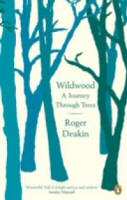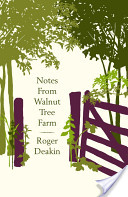
Deakin died just after finishing Wildwood, so this book is automatically poignant: not just a celebration of life and wildness, but also an epitaph for this wonderful, crazy, brilliant, down-to-earth
craftsman of wood and words.

Deakin was very comfortable with wood, and in woods. Indeed there was a timber merchant named Wood in his family, and one of his father’s Christian names was Greenwood, so he tells us. It is at once personal, uncompromising, and captivatingly narrated. There is no academic or intellectual lamentation about how we have lost touch with nature, no vague generalisation: but the truth emerges, clearly and naturally.
He rebuilt his ancient moated house, from a mossed-over, wooded-up ruin, into a lovely, light, airy place: in the process getting to know every one of the 300 beams (“300 trees: a small wood”) that made up the ancient oak frame of the house. He describes the carpenter’s marks on the beams – cut ready to fit together, then transported and assembled on site.
His wanderings about Britain may seem random, but are highly directed: to the places where the Green Man may be found in a dozen churches; to the home of that most English of plants, the Cricket Bat Willow; to the places where those old badgers, Cobbett and Ruskin, protested the injustices meted out to the common man. There is nothing “quaint”, no “folklore” here: just a constant delight in nature, a steady slow-burning fuse of evidence, of hard-won knowledge lightly worn.
Or he shares his visit to the Pilliga forest in New South Wales,
describing in careful but lightly-told detail how the forest of today is not what it seems; how Charles Darwin saw an open park-like woodland, not the dense and lovely tangles that people imagine is the ancient wooded landscape of Australia. He tells from intimate knowledge of the species of trees that used to dominate; of the skill of the Aborigines in managing the land with fire; of the extinction of the local Kamilaroi language, ironically just as the first and last dictionary of that lost tongue was published.
Deakin is not afraid of seeming tame: he is as much at ease telling us about a Bluebell picnic – on a lawn with a woodland view, accompanied by a posse of Cambridge botanists – as roaming the Outback. His knowledge is deep, even encyclopaedic: he collected facts as he collected interesting pieces of wood, stones, feathers – kaleidoscopically. It’s just a pity that there’s no index in the current paperback edition – let’s hope the publisher rectifies this soon.
Wildwood is, quite simply, a delight. You will want to visit the places described; you will look afresh at the wild places you know; and you will be glad that you met Deakin, in the only way that is now possible, through his graceful and supple writing.
Buy it from Amazon.com (commission paid)
Buy it from Amazon.co.uk (commission paid)
See also the review of Deakin’s Notes from Walnut Tree Farm

